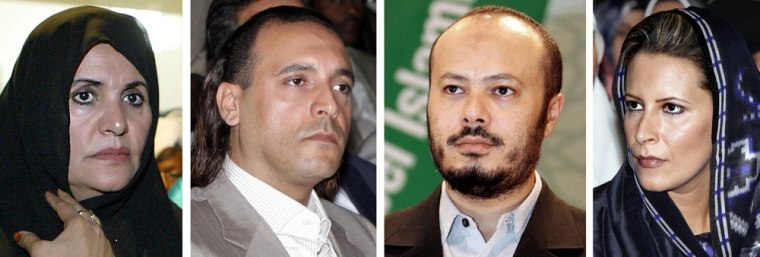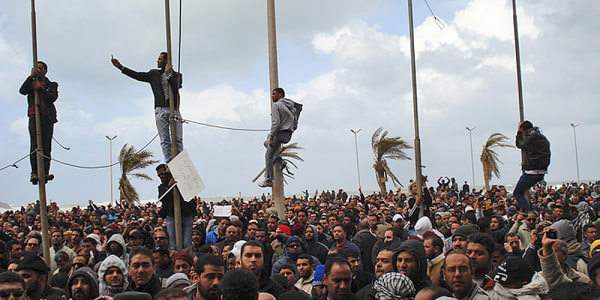Members of Moammar Gadhafi's family have entered Algeria, Algeria's state news agency said Monday, but the whereabouts of the ousted Libyan leader were unknown. Libyan rebels claimed to have killed one of his sons.
The report by APS news agency cited Algeria's Foreign Affairs Ministry as saying Gadhafi's wife Safia, his sons Mohammed and Hannibal, and his daughter Aisha entered the neighboring country on Monday. It did not immediately provide additional details or say whether Gadhafi himself was with the family.
The Egyptian news agency MENA, quoting unidentified rebel fighters, had reported from Tripoli over the weekend that six armored Mercedes sedans, possibly carrying Gadhafi's sons or other top regime figures, had crossed the border at the southwestern Libyan town of Ghadamis into Algeria. Algeria's Foreign Ministry had denied that report.
Libya's de facto government said it considers Algeria's apparent sheltering of members of Gadhafi's family an act of aggression and will seek their extradition.
"We have promised to provide a just trial to all those criminals and therefore we consider this an act of aggression,'' Mahmoud Shamman, a National Transitional Council spokesman, told Reuters.
"We are warning anybody not to shelter Gadhafi and his sons. We are going after them in any place to find them and arrest them,'' he said.

Libyan rebels have accused Algeria of supporting the ousted regime.
Meanwhile, Libyan rebels commanders said another of Gadhafi's son, Khamis Gadhafi, was killed in an airstrike about 60 km (37 miles) south of Tripoli, .
Khamis was said to have been in an armored four-wheel-drive vehicle that was struck by a missile apparently fired from a NATO Apache helicopter, Sky News said.
Sky News' chief correspondent Stuart Ramsay, who was at the scene, said a man claiming to be Khamis' bodyguard confirmed that Khamis had died in the vehicle.
Col. Al-Mahdi Al-Haragi, in charge of the Tripoli Brigade of the rebel army, said he had confirmation that Khamis was badly wounded in the clash near Ben Walid and Tarhoni. He was taken to a hospital but died of his wounds and was buried in the area, Al-Haragi said, without giving the timing.
A U.S. official, speaking on condition of anonymity, told Reuters the U.S. could not yet independently confirm Khamis' death but said similar information was being received in Washington from "reliable sources."
Earlier on Monday, prosecutor Luis Moreno-Ocampo of the International Criminal Court told Reuters he may apply for an arrest warrant for Khamis.
Human Rights Watch said members of the Khamis Brigade, a force commanded by him, appeared to have carried out summary executions of detainees whose bodies were found in a warehouse in Tripoli.
The Hague-based ICC has already approved warrants for the arrest of Moammar Gadhafi, his son Seif al-Islam, and Libyan intelligence chief Abdullah al-Senoussi on charges of crimes against humanity.
The developments came as rebel forces were converging on Gadhafi's hometown of Sirte, hoping to deliver the coup de grace of their revolution.
The fugitive Gadhafi's whereabouts were still not known and it was possible he was still in hiding in Tripoli after it fell to rebel forces and his 42-year-old reign collapsed.
The U.S. has seen no indication that Gadhafi has left Libya, the White House said on Monday.
"If we knew where he was, we would pass that on to the opposition forces,'' White House spokesman Jay Carney told reporters.
There was some fighting Monday on the eastern and western approaches to Sirte. Some have speculated that Gadhafi and other senior regime figures may have fled there.
A NATO officer, who asked not to be identified because of alliance rules, said there was fighting 30 miles (50 kilometers) east of Sirte. He said there are still clashes around Sirte, Bani Walid south of Misrata and Sebha further south.
Taking Sirte will mean getting past entrances that are reportedly mined and an elite military unit. Gadhafi's tribe is the most powerful in the city. Libyans familiar with the coastal city on which Gadhafi has lavished building projects say its first line of defense is a heavily fortified area called the al-Wadi al-Ahmar, 55 miles (90 kilometers) to the east.
The rebels asked NATO Monday to keep up pressure on remnants of Gadhafi's regime.
"Even after the fighting ends, we still need logistical and military support from NATO," Abdul-Jalil said in Qatar. NATO has been bombing Gadhafi's forces since March under a United Nations mandate to protect Libyan civilians.
In other developments, the chairman of the African Union on Monday accused Libyan rebels of indiscriminately killing black people because they have confused innocent migrant workers with Gadhafi's mercenaries. Jean Ping, speaking to reporters in Ethiopia, added this is one of the reasons the AU is refusing to recognize the National Transitional Council as Libya's interim government.
Ping's charges are much stronger than any that have been levied at the rebels by international rights groups. The groups have, however, expressed concern about beatings and detentions of immigrants from sub-Saharan Africa.
Gadhafi had recruited fighters from further south on the continent, but many sub-Saharan Africans are in the country as laborers.
National Transitional Council spokesman Abdel-Hafiz Ghoga denied the AU claims.
"These allegations have been made during the early days of the revolution. This never took place."
Slideshow 81 photos
Libya's uprising against Gadhafi
African leaders' skepticism about the rebels has led to questions about those who received money and arms from Gadhafi in past decades were now repaying him with support. African leaders have insisted they simply do not support regime change by force.
Survivors and human rights groups have said Gadhafi loyalists retreating from Tripoli after decades of brutal rule killed scores of detainees and arbitrarily shot civilians over the past week.
Council spokesman Ghoga said his representatives have collected names in cities rebels have liberated, resulting in a list of some 50,000 people rounded up by the Gadhafi regime since the uprising began six months ago. He said rebels freed 10,000 from prisons, leaving at least 40,000 unaccounted for.
In the capital, members of the National Transitional Council announced further steps to becoming an effective government. Suleiman Mahmoud al-Obeidi, the rebels' deputy military chief, announced the formation of a 17-member committee to represent the 30 or local military councils he said had been set up in the country's west.
The war was fought by disparate, local groups with only loose coordination. Bringing all local councils and rebel brigades under the council's leadership remains a challenge.
France said Monday it was dispatching a team of diplomats to reopen the French embassy there and see how France can aid the city. The European Union also was seizing a foothold in Tripoli. Kristalina Georgieva, European commissioner for international aid, said Monday the EU has opened a humanitarian office to help distribute medical and other emergency aid in the Libyan capital.
Meanwhile, the stench of rotting bodies and burning garbage hung over the capital Tripoli, where food, water and other supplies were running short.
NBC News' Stephanie Gosk in Tripoli described how the city was struggling to cope with the growing number of corpses.
"There are so many unclaimed bodies in the hospitals and morgues that it has gotten to point where they are just burying them," she said.
At a public cemetery visited by a NBC News team, a crew of about 15 men were burying the bodies. Each was photographed and checked for identification before being buried, Gosk reported.
Many corpses have been found, some of slain Gadhafi soldiers, others the victims of killings in cold blood.
Rebel military spokesman Col. Ahmed Bani said there was concern for the fate of 40,000 prisoners who he said had been detained by Gadhafi's forces and who were still unaccounted for. It was possible some were being held in underground bunkers in Tripoli that rebels had been unable to locate.
Sarah Leah Whitson, of Human Rights Watch, said: "The evidence we have been able to gather so far strongly suggests that Gadhafi government forces went on a spate of arbitrary killing as Tripoli was falling."
